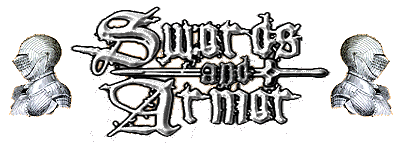
Knights Templar Shield - Hand Painted

|
SH503P-DG-HG-Templar-Distressed
SH503P-DG-BR-Templar-Distressed This Replica Medieval Shield . . . is constructed of 16 ga. steel. The shield size is 18" x 24" and it has a curved shape. It is the classic "Heater" style battle shield. They face of the shield is sprayed with a protective clearcoat to preserve the artwork. The shields are available in either a wall display version with a chain to hang from or a hand-held battle ready version with heavy duty 1 1/2" leather straps on the back. Order the version you desire below.
|
Knights Templar - The Mystique of the Middle Ages
For three hundred years, Islamic
forces had driven ever deeper into medieval Christian Europe, beginning with the
Iberian Peninsula where Spain, Portugal and France are located. As the Franks before
them, they gobbled up portions of the third largest European peninsula, and began
adding mosques and their unique architecture to the landscape to the dismay of the
Church, who was seeing Christiandom swamped by infidels with ceaseless attacks,
taking them into the very heart of France. By 732, they were routed back into Southern
Italy and Sicily but even from there, the Seljuk Turks reached their hands into
sacred Rome and ransacked the Basilica there. Pope Urban II saw no choice except
to form the First Crusade, not against Islam but against the Seljuk Turks who were
now in control of Jerusalem, the most holy of Christian cities, and who had replaced
the more tolerant Arab keepers with intolerance and violence towards pilgrims. By
the end of 1099, the objective of obtaining control over this most sacred city had
been achieved and the Christian leaders now faced another dilemma- who would govern
and defend these foreign lands?
The answer to their prayers came in the form of a group of knights who, under the
supervision of Hugues de Payens had been ferrying pilgrims safely to the now available
Jerusalem and back to Europe. The feudal system had been established with the conquerors
of Jerusalem, with the territory being divided up amongst the many leaders of the
First Crusade. Much bickering began to occur and the Europeans began to fight each
other as much as fending off the Seljuk Turks. In the meantime, the group of knights
under Hugues de Payans had gained the support of one of the pillars of the Church,
Bernard de Clarvaux, the Cistercian Abbot. Under his guidance at the Champaigne
Council of 1128-1129, the Order was recognized and its rules established by the
Church through Abbot Bernard, to become the first international army with Hugues
de Payans as its first Master of the Temple.
The Templars Knights order was unique in that it combined both military and the
monastic lifestyle and they became known as ‘The Warrior Monks.” Their
primary purpose was to bring order to the region of Jerusalem. By 1149, the group
had evolved into an organization that only answered to the Pope and were financially
independent, depending on resources throughout Europe. Their Houses in Europe became
clearing houses for the finances given to them and was the beginning of international
banking. This independence and worldly wealth was the envy of many and the rumors
swirled as to the true nature of the organization.
At its height, the Templars boasted 7000 members, had its own naval fleet and 870
castles and other holdings spread throughout Europe, Palestine and Syria. They were
the inspiration behind other groups of Monastic Knights, including the Teutonics
and the Hospitallers and reached their height of usefulness and service by the mid-12th
century. By the 13th century, tales of widespread corruption and their eventual
loss of power in the Crusader States marred the reputation of this brilliant group
which led to their eventual disbandment by Pope Clement V in 1314 of ecclesiastical
relations and were outlawed by King Philip IV of France around the same time. Many
kings and other leaders agreed and the Order was officially dissolved.
Many of the Templars were absorbed into other Orders or changed the name of their
Order, their houses divided up and the gains that were found distributed. However,
by Papal Bull, the financial records were supposed to be given to the Hospitallers
but were never found. The fleet of ships disappeared and many of the Templars as
well.
Becoming known as ‘The Brotherhood”, the
surviving hidden Templars finally came to light in 1705 when Philip, Duke of Orleans
revealed himself as a Grand Master of the Templars. By 1736, Freemasonry had begun
to take hold in England and Scotland with its roots in the Templar Order. A revival
of the Order occurred under Napoleon Bonaparte’s patronage in 1805 and the
group emerged as an Order dedicated to help, decency, dedication and chivalrous
behavior. The Order had political sway and involved itself in French politics, eventually
leading again to its visual disappearance. It re-emerged in the 20th century with
its ranks consisting of many retired military personnel and continues to this day
with inner struggles for leadership, losing much of its historical luster in the
process.
We owe much to the early Templar Knights and their faith
to God which led them to strange lands and stranger politics. Their example of combining
simple prayer with defense of those helpless and in need through excellent military
leadership is what should be recognized and remembered whenever one sees their well-
known Templar Red Cross on a White background.
More Hanging Medieval Shields For Wall Display
Swords and Armor Specials !
New Introductions - Closeouts
- All Great Bargains
Shipping Policies and Rates - Returns
Payment Methods
We accept Visa, Master Card, American Express,
Discover Card and PayPal
copyright 2001-201 swordsandarmor.com
. All Rights Reserved
privacy policy